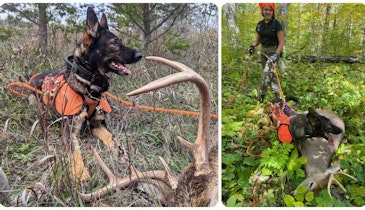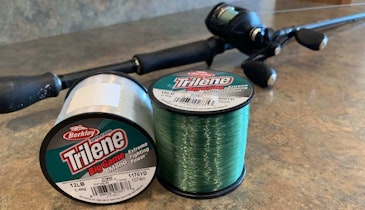There is no question that the post pandemic “new normal” is now and will continue to be very much different in some ways from anything we knew before, yet in other ways it likely will be more of the same.
The first new reality has to do with money. It takes a lot more of it now to do any kind of predator hunting than it did before Covid. And that is if the products needed for the hunts are even available. Bluntly, we’ve been given a full dose of what happens when a culture is abused while an economy is disrupted. Some have called it a “perfect storm.” No argument there, but a perfect storm comes and then it is gone. What we’re going through these days not only seems never-ending but gets worse as time goes by.
So much for whining. Just figure that ammunition, when you can find the right stuff, is going to cost at least twice as much as pre-pandemic. The same is pretty much true for the gasoline or diesel fuel it takes to get to the predator hunt in the first place. For some predator hunters, this means fewer hunts and/or shorter hunts. There are economic realities that cannot be ignored. Those relatively few who are well healed enough to weather the economic blitz can consider themselves lucky.
And the truth is that those kinds of higher prices are likely to be the norm for the short term and “good deals” long-term. This is because of record inflation. Even if the record levels of inflation flatten off, there likely will not be a significant reduction in prices. We’ll be lucky just to hold the line. At least that’s the way it has been following previous inflationary times.
To understand this dynamic, look at Europe, where hunting is quite expensive. As the population of North America continues to grow (perhaps exponentially with the recent and anticipated flood of immigrants from all over the world who are seeking and will seek asylum from a wide variety of global hotspots), places to hunt will get farther away and there likely will be increased pressure on the wildlife resources that remain.
It is not all doom and gloom because, as is the case in Europe, hunting is destined to continue. It will just be more expensive, and at each increased price point some hunters fall off, simply because they can no longer afford it. My strategy is to hunt as often as possible now. If things get better, no problem. I’ll keep on hunting. If things get worse, at least I know I will have hunted as much as I could. In other words, don’t put off today what might not be available tomorrow.
Meanwhile, the anti-hunters remain on the prowl, ever wanting to hamstring hunters and stop all hunting by way of attacking anything hunt-related, one bit at a time. One bill in Congress that could affect many predator hunters is H.R. 7398, or the Prohibited Wildlife Killing Contests Act of 2022. If enacted, it would ban predator killing contests on federal lands. Although Congress has dominion over federal lands, the management of the wildlife on those lands is the purview of the states. Attempted Congressional overreach has become the rule rather than the exception.
Often, calls to ban predator contests are based on emotion rather than scientific evidence or sound wildlife management strategies. Effective wildlife management often requires robust predator hunting opportunities. Each state is different, and each state should have management authority. Congress should not dictate how states manage wildlife, including whether wildlife killing contests are available tools to manage predators or other species. Predator hunters should contact their Congressional representatives and oppose H.R. 7398.
And predator hunting in Alaska is being challenged in court where hunters are being defended by Safari Club International. “The Ninth Circuit Court of Appeals rejected arguments raised by the State of Alaska and SCI in our appeal of a district court decision upholding two restrictions on hunting on the Kenai National Wildlife Refuge in Alaska,” SCI reported. “The State and SCI challenged restrictions on hunting brown bears over bait and restrictions on predator hunting on the Skilak area of the refuge in a 2016 lawsuit.
“The district court ruled in our favor on one issue, but upheld these two restrictions as valid under the Alaska National Interest Lands Conservation Act and other laws. The Ninth Circuit agreed. SCI is considering further appellate options, particularly in view of the Supreme Court’s recent track record of reversing Ninth Circuit rulings on ANILCA,” SCI explained.
Meanwhile, Rep. Lauren Boebert, R-CO, has joined the effort to delist gray wolves from the U.S. Endangered Species Act. “Rep. Lauren Boebert has taken a firm stance against a federal courts decision to reinstate the protection of gray wolves on the U.S. Endangered Species Act list, in a letter addressed to the U.S. Department of Interior’s Secretary Deb Haaland,” reported From Out There Colorado.
The report continued: “In February, U.S. District Judge Jeffrey White from Oakland, California, restored protection for gray wolves across the country. According to Jeffrey, the U.S. Fish and Wildlife Service failed to prove that wolves can sustain populations throughout the Midwest without protection. “The species was previously removed from the list in 2020. At the time, gray wolves across the country were referred to as ‘successfully recovered.’
“The gray wolf is fully recovered, should remain delisted in the Lower 48 United States, and should be managed by the states. It’s really that simple. Some activist judge from California shouldn’t be able to overturn the best available science and contradict the law based on leftist political beliefs,” Boebert said in the letter.
“She also claims that there are around 3,000 gray wolves currently living across the Rocky Mountain states. State and private conservation efforts have been shown to be more than adequate in managing gray wolves at sustainable levels since de-listing and gray wolf populations in the areas designated by these petitions — such as Idaho, Montana and Wyoming — have far exceeded the federal management objectives of 150 wolves and 15 breeding pairs per state,” Boebert said. “The letter, signed by 22 other congressmen and women, urged Secretary Haaland to appeal the federal ruling.”
So, the new normal will be new in many ways, but the same old thing in other ways. The beat goes on.






